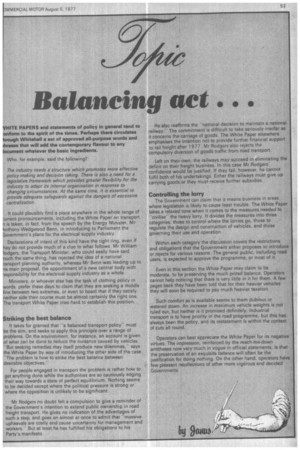'Balancing act • • •
Page 55

If you've noticed an error in this article please click here to report it so we can fix it.
VHITE PAPERS and statements of policy in general tend to :onform to the spirit of the times. Perhaps there circulates hrough Whitehall a set of approved all-purpose words and thrases that will add the contemporary flavour to any locument whatever the basic ingredients.
Who, for example, said the following?
The industry needs a structure which promotes more effective policy making and decision taking. There is also a need for a legislative framework which provides greater flexibility for the industry to adapt its internal organisation in response to changing circumstances. At the same time, it/s essential to provide adequate safeguards against the dangers of excessive centralisation.
It could plausibly find a place anywhere in the whole range of :urrent pronouncements, including the White Paper on transport. It is taken, in fact, from the speech by the Energy Minister, Mr knthony Wedgwood Berm, in introducing to Parliament the Government's plans for the electrical supply industry.
Declarations of intent of this kind have the right ring, even if hey do not provide much of a clue to what follows_ Mr William lodgers, the Transport Minister, who could easily have said .nuch the same thing, has rejected the idea of a national :ransport planning authority, whereas Mr Benn was leading up to is main proposal, the appointment of a new central body with 'esponsibility for the electrical supply industry as a whole.
Ministers, or whoever else has the task of clothing policy in words, prefer these days to claim that they are seeking a middle line between two extremes, or even to boast that if they satisfy neither side their course must be almost certainly the right one. The transport White Paper tries hard to establish this position.
Striking the best balance It takes for granted that "a balanced transport policymust be the aim, and seeks to apply this principle over a range of problems. On the environment, for instance, an account is given of what can be done to reduce the nuisance caused by vehicles. "But seeking remedies may itself produce new dilemmas," says the White Paper by way of introducing the other side of the case. "The problem is how to strike the best balance between desirable objectives,"
For people engaged in transport the problem is rather how to get anything done while the authorities are so cautiously edging their way towards a state of perfect equilibrium. Nothing seems to be decided except where the political pressure is strong or where the opposition is unlikely to be significant.
Mr Rodgers no doubt felt a compulsion to give a reminder of the Government's intention to extend public ownership in road freight transport. He gives no indication of the advantages of such a step, and goes on almost at once to admit that 1-massive upheavals are costly and cause uncertainty for management and workers." But at least he has fulfilled his obligations to his Party's manifesto. He also reaffirms the "national decision to maintain a national railway.The commitment is difficult to take seriously insofar as it concerns the carriage of goods. The White Paper elsewhere emphasises the intention not to provide further financial support to rail freight after 1977, Mr Rodgers also rejects the
compulsory diversion of goods traffic from road transport.
Left on their own, the railways may succeed in eliminating the deficit on their freight business. In this case Mr Rodgers' confidence would be 'justified. If they fail, however, he cannot fulfil both of his undertakings. Either the railways must give up carrying goods or they must receive further subsidies.
Controlling the lorry The Government can claim that it means business in areas where legislation is likely to cause least trouble, The White Paper takes a relaxed tone when it comes to the measures needed to "civilisethe heavy lorry. It divides the measures into three categories: those to control where the lorries go, those to regulate the design and construction of vehicles, and those governing their use and operation
Within each category the discussion covers the restrictions and obligations that the Government either proposes to introduce or rejects for various reasons. The general public, including road users, is expected to approve the programme, or most of it Even in this section the White Paper may claim to be moderate, to be preserving the much prized balance. Operators cannot help noticing that there is very little in it for them. A few pages back they have been told that for their heavier vehicles they will soon be required to pay much heavier taxation.
Such comfort as is available seems to them dubious or watered down. An increase in maximum vehicle weights is not ruled out but neither is it promised definitely. Industrial transport is to have priority in the road programme, but this has always been the policy, and its restatement is within the context of cuts all round.
Operators can best appreciate the White Paper for its negative virtues. The impression, reinforced by the reach-rne-down antitheses now very much in vogue in official statements, is that the preservation of an exquisite balance will often be the justification for doing nothing. On the other hand, operators have few pleasant recollections of other more vigorous and decided Governments








































































































